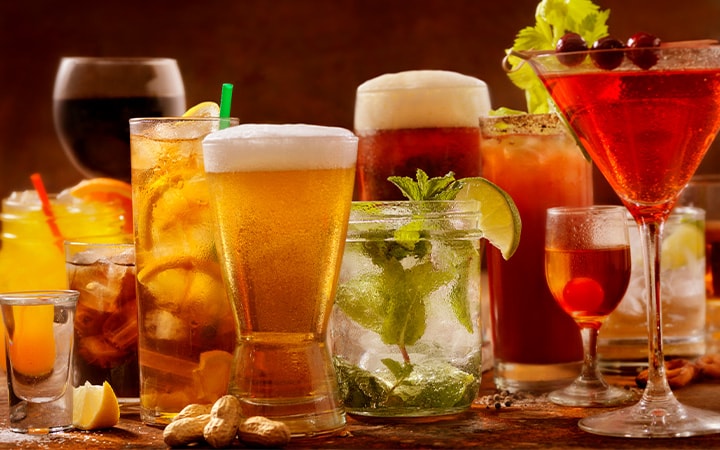The Link Between Drinking Alcohol and Cancer Risk
April 21, 2023

Most people know that using tobacco products can cause cancer of the lungs, mouth, throat and other parts of the body. What is less known is that drinking alcoholic beverages is also linked to an increased risk for developing several types of cancer.
“In the U.S., alcohol use accounts for approximately 6 percent of all cancers and about 4 percent of all cancer deaths,” says Hussein Hamad, MD, an oncologist and hematologist at UH Seidman Cancer Center at UH Geauga Medical Center. “In fact, alcohol use is one the most modifiable risk factors for cancer in general behind using tobacco products and having excess body weight.”
What Types of Cancer Are Linked to Drinking Alcohol?
“We see a strong link between alcohol consumption and an increased risk of developing cancers of the upper digestive and upper respiratory tracts,” says Dr. Hamad. “These cancers include oral, throat, larynx and esophageal cancer. In general, the risk for these cancers is five times greater for people who drink alcohol than for those who don’t. Heavier drinkers at a higher risk than moderate and light drinkers.”
Other types of cancer linked to alcohol consumption include:
- Liver cancer
- Breast cancer (in women)
- Colorectal cancer
Are Certain Types of Alcohol Worse Than Others?
All alcoholic drinks, including beer, wine, distilled spirits and liqueurs, contain the same type of alcohol: ethanol. But the amount of ethanol contained in alcoholic beverages, even among beverages of the same type, differs significantly.
“Cancer risk is primarily associated with ethanol. In general, the more ethanol a person consumes by regularly drinking alcoholic beverages over time – regardless of the beverage type – the higher their risk of developing alcohol-related cancers,” says Dr. Hamad.
How Does Alcohol Increase the Risk of Developing Cancer?
The ways that alcohol may affect cancer risk are not entirely clear. However, we know that when you drink an alcoholic beverage, your body breaks down the ethanol into acetaldehyde, a known toxin. Acetaldehyde can damage DNA – the genetic instructions in our cells that control normal cell growth and functioning – and the proteins in your cells. The chemical has been shown to cause cancer in lab animals and likely causes cancer in humans.
Other ways that alcohol may increase cancer risk include:
- Causing oxidative stress, a condition where too many unstable molecules (called free radicals) are present in the body and not enough antioxidants are present to get rid of them. Oxidative stress can lead to the development of cancer cells.
- Reducing the body’s ability to break down and absorb certain nutrients that may be associated with cancer risk.
- Increasing blood levels of the sex hormone estrogen, which is specifically linked to higher risk for breast cancer.
In addition, some alcoholic beverages may contain certain carcinogenic (cancer-causing) substances that get introduced during the fermentation and production processes. These contaminants include:
- Nitrosamines
- Phenols
- Hydrocarbons
- Asbestos fibers
Where Are We Falling Short?
The link between alcohol consumption and increased cancer risk is not new. The problem is that certain misconceptions and conflicting information have prevented this knowledge from reaching much of the public in an environment where the beverage industry largely controls the messaging.
“We still see barriers toward educating the public,” Dr. Hamad says. “For example, the belief that drinking red wine improves heart health is largely unconfirmed, yet many people think it is true. As a result, some people may be less inclined to think that red wine can increase cancer risk.”
There’s also a lack of awareness among some healthcare workers. In a recent study, 95 percent of family physicians surveyed were aware of the link between alcohol consumption and head and neck cancers, whereas only 40 percent of surveyed dentists were.
Dr. Hamad is in agreement with many other physicians in that more effective ways of educating the public are needed. This includes more complete warning labels on alcoholic beverages. In the meantime, Dr. Hamad says one of the best ways of getting the message out there is through direct discussion between doctors and their patients.
Related Links
At University Hospitals Seidman Cancer Center, our care team offers the most advanced forms of cancer care, including prevention, screening, diagnosis, treatment and cancer survival support. Our disease-focused teams design personalized cancer treatment plans for every patient who entrusts their care to us.


